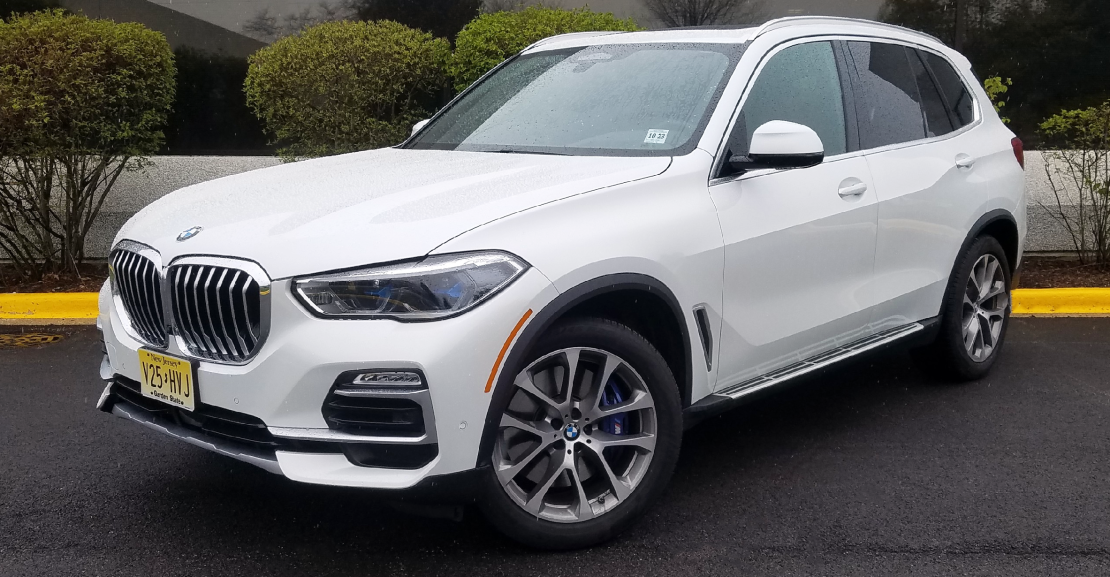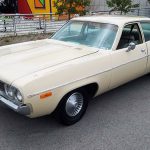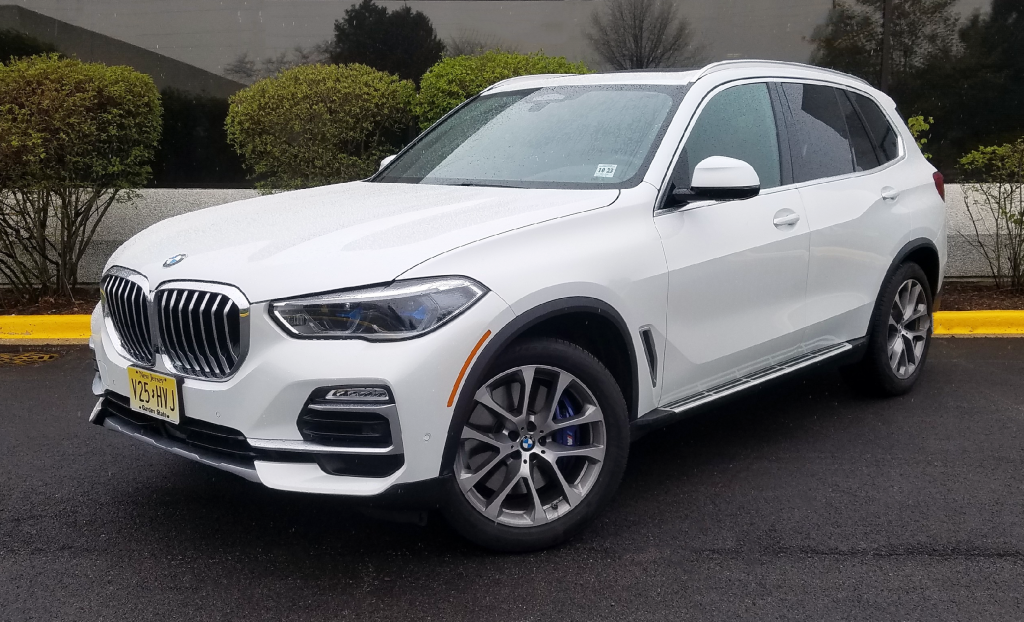
 2019 BMW X5 xDrive40i
2019 BMW X5 xDrive40i
Class: Premium Midsize Crossover
Miles driven: 381
Fuel used: 17.7 gallons
Real-world fuel economy: 21.5 mpg
Driving mix: 50% city, 50% highway
| CG Report Card | |
|---|---|
| Room and Comfort | B+ |
| Power and Performance | B+ |
| Fit and Finish | A |
| Fuel Economy | B- |
| Value | B- |
| Report-card grades are derived from a consensus of test-driver evaluations. All grades are versus other vehicles in the same class. Value grade is for specific trim level evaluated, and may not reflect Consumer Guide's impressions of the entire model lineup. | |
| Big & Tall Comfort | |
| Big Guy | A |
| Tall Guy | A |
| Big & Tall comfort ratings are for front seats only. "Big" rating based on male tester weighing approximately 350 pounds, "Tall" rating based on 6'6"-tall male tester. | |
| Drivetrain | |
| Engine Specs | 335-hp 3.0L |
| Engine Type | Turbocharged six |
| Transmission | 8-speed automatic |
| Drive Wheels | AWD |
EPA-estimated fuel economy: 20/26/22 (city/highway combined)
Fuel type: Premium gas recommended
Base price: $60,700 (not including $995 destination charge)
Options on test car: Mineral White Metallic paint ($550), Coffee Vernasca leather ($1450), Convenience Package ($1150), Driving Assistance Plus ($1700), Premium Package ($2050), Executive Package ($2050), 20-inch alloy wheels ($600), M Sport brakes ($650), 2-axle air suspension ($1000), running boards ($400), heated front seats/arm rests/steering wheel ($250), leather dashboard ($1200), Harmon Kardon surround-sound audio system ($875), leather upholstery credit (-$1450), gesture control credit (-$190)
Price as tested: $73,980
Quick Hits
The great: Powertrain performance, ride and handling balance
The good: High-end cabin, cargo versatility
The not so good: Pricey options, complicated infotainment system
More X5 price and availability information
John Biel
Proper, serious sport-utility vehicles are designed to contend with all kinds of obstacles, but one thing none of them can conquer is time. In order to keep up with the market, manufacturers sooner or later have to hit the “Reset” button. In that vein, BMW presents an all-new take on the X5—its premium midsize SUV—for 2019.
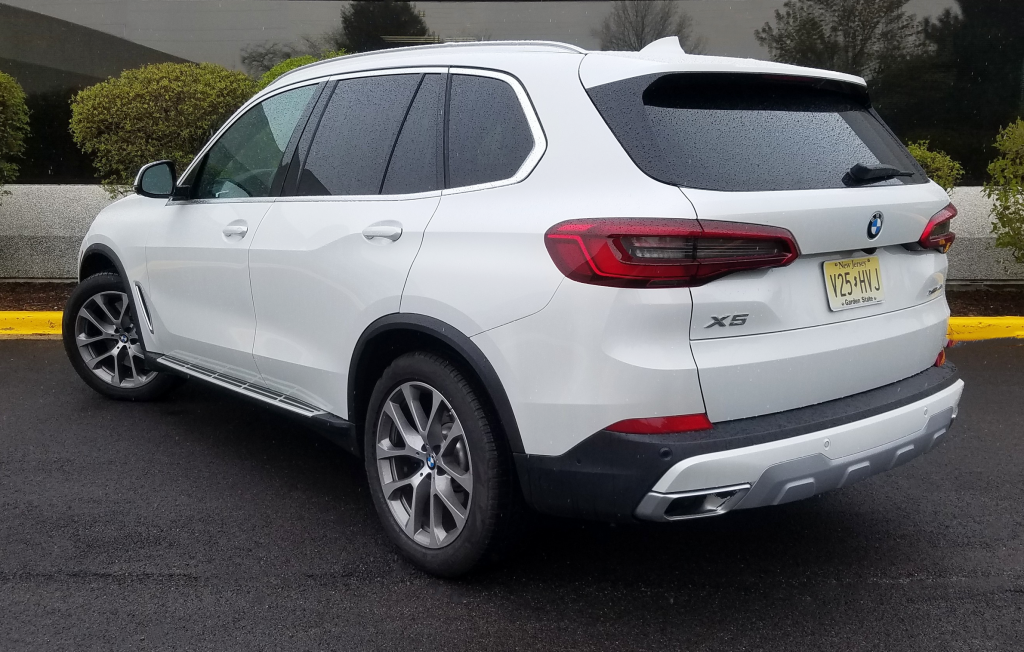
The redesigned fourth-generation X5 launches as a 6-cylinder xDrive40i and a V8 xDrive50i with spikier styling and several new technology features. Consumer Guide put in some time with the 40i, which starts at $61,695 including delivery.
Test Drive: 2019 Maserati Levante GTS
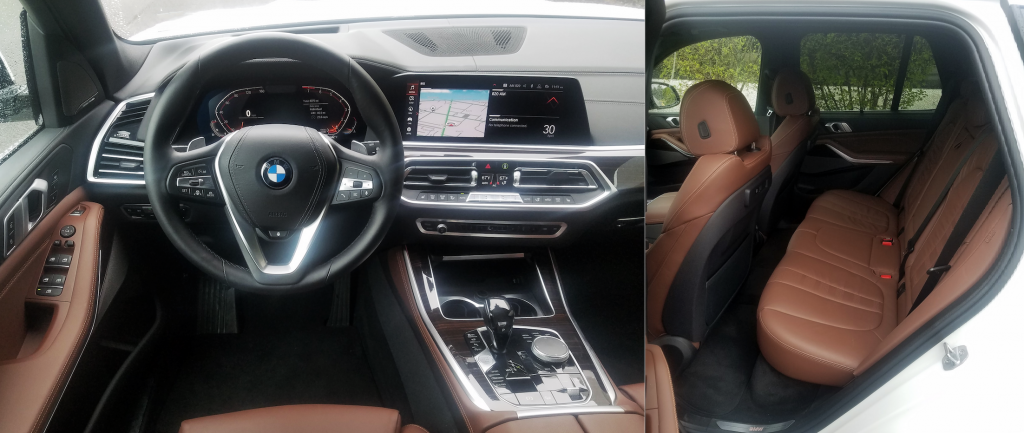
Among the available options for the X5 is an Off-Road Package with skid plates, a mechanical differential lock, and selectable chassis/drivetrain settings for four different types of terrain. Lacking this package, CG’s test vehicle was more mall crawler than rock hopper, festooned with option groups heavy on convenience and technology features that helped push it to a bottom-line price of $73,980.
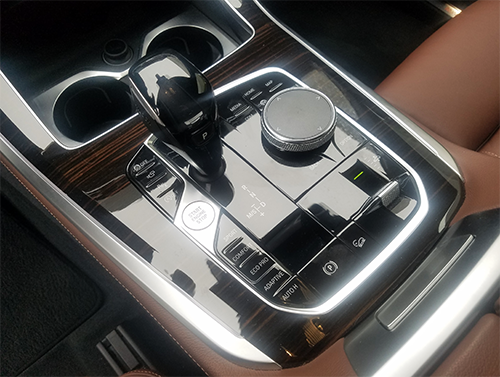
The powertrain package for the xDrive40i is a turbocharged 3.0-liter six of 335 horsepower (a gain of 35 from 2018), marshalled through an 8-speed automatic transmission to torque-proportioning xDrive all-wheel drive. Even in base “Comfort” driving mode the engine is smooth and strong, with plenty of torque that peaks as early as 1500 rpm for snappy getaway and quickly building speed. Tapping into the “Sport” and “Sport+” settings perceptibly sharpens throttle response and, especially in Sport+, ushers in sportier transmission performance. (BMW claims 0-60-mph capability of 5.3 seconds.) The velvety transmission, which included steering-wheel paddle shifters, kicks down smartly in highway passing situations.
At a curb weight in excess of 4800 pounds, the 40i won’t be a paragon of petroleum parsimony, but it seemed to at least nearly match the EPA projections during our time with the vehicle. This reviewer put 259.5 miles on the Mineral White Metallic tester, 54 percent of that in city-style driving, and recorded 20.98 mpg. The feds say an xDrive40i should get 20 mpg in the city, 26 on the highway, and 22 combined.
The test truck was equipped with extra-cost 4-wheel air suspension (only rear-axle air suspension was available before) that delivers a ride that’s particularly cushy for an SUV. Indeed, there are moments—say during a quick stop—when it begins to feel wobbly in the cabin. There’s a tighter feeling in the Sport modes. Despite the size and weight, steering response is very good. The big 4-wheel disc brakes accomplish quick, clean stops.
Quick Spin: 2019 Volvo XC60 Plug-in Hybrid
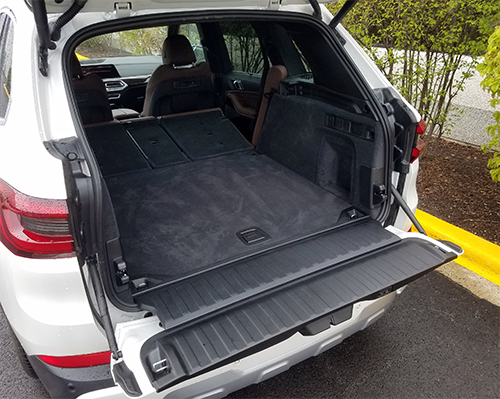
The interior is impressively quiet, even when the X5 is hustling down the highway with a faint but reassuring thrum from the engine as an undertone. Wood trim and numerous bright-metal accents impart a heightened sense of luxury. The test car included extra-cost coffee-colored leather seating surfaces and optional leather for the dashboard surface. Soft-touch surfaces are amply distributed. Seats are comfortable and provide good support—especially in front, with the signature cushion extenders.
Evaluating the interior leads us to the subject of controls, and that makes it impossible to ignore “Live Cockpit Pro.” This is the newest-generation iDrive infotainment center, viewed on a 12.3-inch screen that rises out of the center of the dash, but is still manipulated via a dial on the console. On the main screen, a stack at the left edge lets drivers select media, communication, navigation, vehicle systems, or apps by scrolling with the controller and clicking to open one of those menu choices. That’s direct enough. Once there, however, numerous other subtopics are laid out for further selection—and you never know what you’ll find without making yourself fully steeped in the owner’s manual (which can be accessed on the screen—one more thing to open.) For instance, this driver’s frustrating search for a mere trip odometer was—accidentally, it seemed—solved when he stumbled onto a window that also included a cumulative counter for time spent in ignition-stop mode when the standard stop/start function is activated, and a detailed graph plotting real-time fuel consumption relative to average fuel use. Who knows? Maybe there is a desire for post-shopping-trip telemetry analysis that has been going unmet all these years.
At least the audio selections seemed way easier to program and access than in other recent BMWs. A button-intensive strip of controls governs the climate system. Driving controls show up on another 12.3-inch screen.
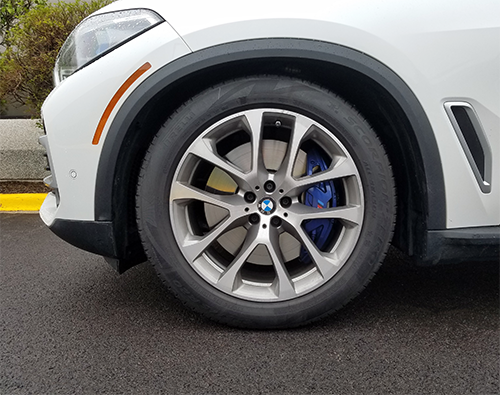
Legroom and headroom are ample in both rows, even beneath the standard panoramic moonroof. There’s nominal room—and a modicum of comfort—for a third adult in the middle of the second row. Though CG’s test vehicle didn’t have it, a third-row seat with space for two presumably cramped passengers is available. Drivers will find generally good sightlines, with less-obstructive rear roof pillars than many SUVs have.
Cabin storage rests on a passable glove box, a small padded-top console with divided side-hinged lids, hard-sided pouches on the backs of the front seats, and large door pockets with bottle holders. A covered bin at the front of the console contains heated and cooled cup holders. The pull-down rear armrest has a shallow covered bin and twin pop-out cup holders.
A fully powered 2-part tailgate makes for easy loading on a flat cargo floor. The 5-passenger model leaves room for a generous underfloor storage space; a piston prop supports the floor while loading. Second-row 40/20/40 seats don’t fold fully flat, but the transition from the cargo area is uninterrupted to aid long-object loading. The seats can be dropped remotely via levers in the sidewalls of the cargo bay.
The tested X5 sported a wide array of features. Some of the other standard gear included satin-aluminum roof rails and exterior trim; LED headlights with automatic high-beam control; Apple CarPlay compatibility; heated 16-way-adjustable front seats; and a suite with frontal collision warning, lane-departure warning, and blind-spot detection. The option complement included 20-inch alloy wheels, 4-zone climate control, Harman Kardon surround-sound audio, satellite radio, head-up display, wireless charging, and BMW’s gesture-control system for symphony-conductor wannabes. It all constitutes a modern SUV that can be cushy, capable—or both.
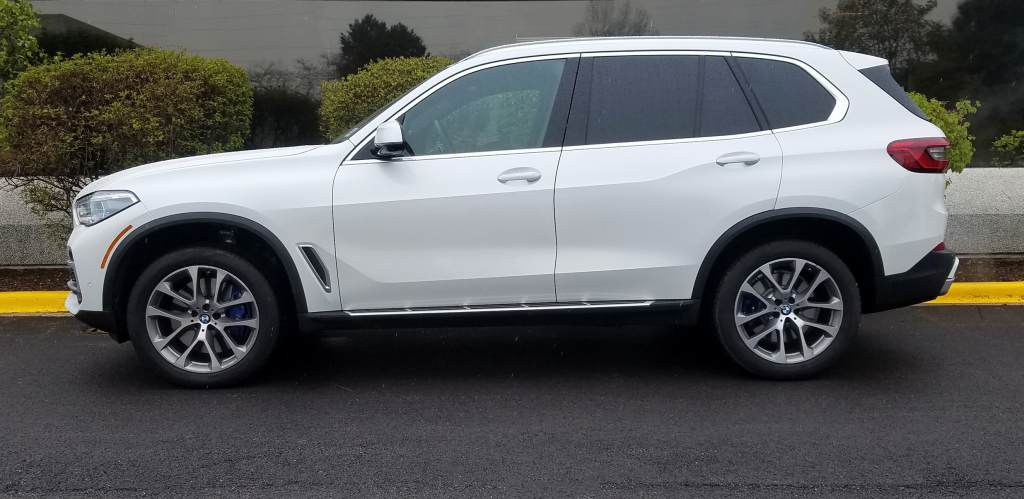
$200,000 Plus: The Most Expensive SUVs
2019 BMW X5

